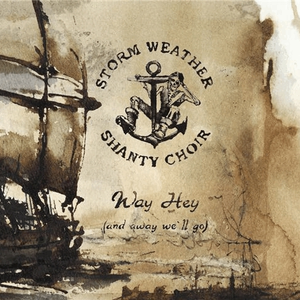Since the choir was established, they have managed to release 5 cds and done lots of concerts and performances. Some of the highlights of the past few years have been the Langesund International Shantyfestival, Festival Maritim in Bremen (Germany), Telemarkfestivalen in Bø and Bergenfest 2006, and they are currently doing well in Japan. Feedback from their concerts have been very good, and they think that the main reason for their “little success” is that they enjoy so much doing this, and also that they allow and encourage their guests to sing along!
Theyr mission and main directives is to bring forth a forgotten song tradition. At the same time they wish to give their audience, and themselves, a lot of fun, and experience the pleasure of salty folk music. With the old true sailors in mind, they wish to give the shanties all the power, humour and respect they deserve.
The most of their stuff is done a cappella, but they also include mandolin, flute, and guitar on some of their songs. As far as it is possible, they do their concerts without any microphones. "They did not use microphones while rounding the salty Cape Horn, so we should be able to do the same in a pub!!"
Band members: Håkon Vatle, Ronny Sætre, Rune Nesse, Vidar Vedå, Roald Kaldestad and Gisle Østrem
Boney
Storm Weather Shanty Choir Lyrics
Jump to: Overall Meaning ↴ Line by Line Meaning ↴
Way ay-ya!
A warrior, a terrier
John Francoise
Boney beat the preussians
Way ay-ya!
The Austrians and the Russians
Boney went to Moscow
Way ay-ya!
Lost his army in the snow
John Francoise
Boney was no frenchyman
Way ay-ya!
So he retreated back again
John Francoise
Boney went to Elbow
Way ay-ya!
And there he got his overtrow
John Francoise
Boney was a warrior
Way ay-ya!
A warrior, a terrier
John Francoise
Boney went a-cruisin
Way ay-ya!
A-board the Belly Ruffian
John Francoise
Boney went to Saint Helen
Way ay-ya!
An he never came back again
John Francoise
The Storm Weather Shanty Choir's song Boney is a lively tune that recounts the story of Napoleon Bonaparte's military conquests and his eventual downfall. The lyrics suggest that Boney was a fierce warrior, confident in his abilities to defeat his enemies. He led his army against the Prussians, Austrians, and Russians, but suffered defeat when he went to Moscow and his army became trapped in the snow. The lyrics also suggest that Boney was not French but retreated back after his defeat.
The song highlights the contradictory nature of Napoleon's life and legacy. He was both a charismatic leader who inspired his troops and a ruthless general who led his country into wars that caused widespread destruction. The lyrics reflect this dichotomy. Boney is portrayed as a heroic warrior who beats his foes, but he is also a vulnerable human being who suffers defeat and retreats.
Overall, Boney is an entertaining and insightful song that captures the complex personality and legacy of Napoleon Bonaparte.
Line by Line Meaning
Boney was a warrior
Napoleon Bonaparte was a warrior who was determined to conquer and expand his empire.
Way ay-ya!
A sailor’s chant used to build rhythm and create a sense of unity among the crew members.
A warrior, a terrier
Napoleon Bonaparte was a warrior and fighter, much like a terrier dog with its fierce determination and tenacity.
John Francoise
The name of the ship the sailors are on or a shout to give a sense of unity among the singing crew.
Boney beat the preussians
Napoleon Bonaparte defeated the Prussians in a battle, displaying his strength and power as a leader of his army.
The Austrians and the Russians
Napoleon Bonaparte’s army fought and defeated the Austrians and the Russians, further proving his military prowess and determination.
Boney went to Moscow
Napoleon Bonaparte led his army to Moscow during his campaign of expansion, hoping to gain more land and power for his empire.
Lost his army in the snow
Napoleon Bonaparte's army was not prepared for the harsh conditions and cold weather of Moscow, resulting in a significant number of losses and dwindling army size.
Boney was no frenchyman
Napoleon Bonaparte was not a traditional Frenchman, as he had Italian roots and had grown up in Corsica. However, he became the leader of France and its empire.
So he retreated back again
Napoleon Bonaparte was forced to retreat back from Moscow due to many losses, including his army size, resources, and overall strength. It ultimately led to his decline in power and leadership.
Boney went to Elbow
Napoleon Bonaparte led his army to Elba, an island in the Tyrrhenian Sea near Italy, after his defeat and exile from France.
And there he got his overtrow
Napoleon Bonaparte's power and leadership were overthrown when he was exiled to the island of Elba, with his empire crumbling and many people turning against him.
Boney went a-cruisin
Napoleon Bonaparte went on a cruise on the HMS Bellerophon, heading for exile to Saint Helena after his defeat at the Battle of Waterloo.
A-board the Belly Ruffian
The HMS Bellerophon, where Napoleon Bonaparte was held captive and exiled, was nicknamed the 'Belly Ruffian' by the sailors on board.
Boney went to Saint Helen
Napoleon Bonaparte was exiled and lived the rest of his life on the island of Saint Helena in the South Atlantic Ocean, where he eventually died.
An he never came back again
Napoleon Bonaparte never returned to France or his empire again after being exiled, leading to the end of an era in French and European history.
Writer(s): traditional
Contributed by Levi M. Suggest a correction in the comments below.
